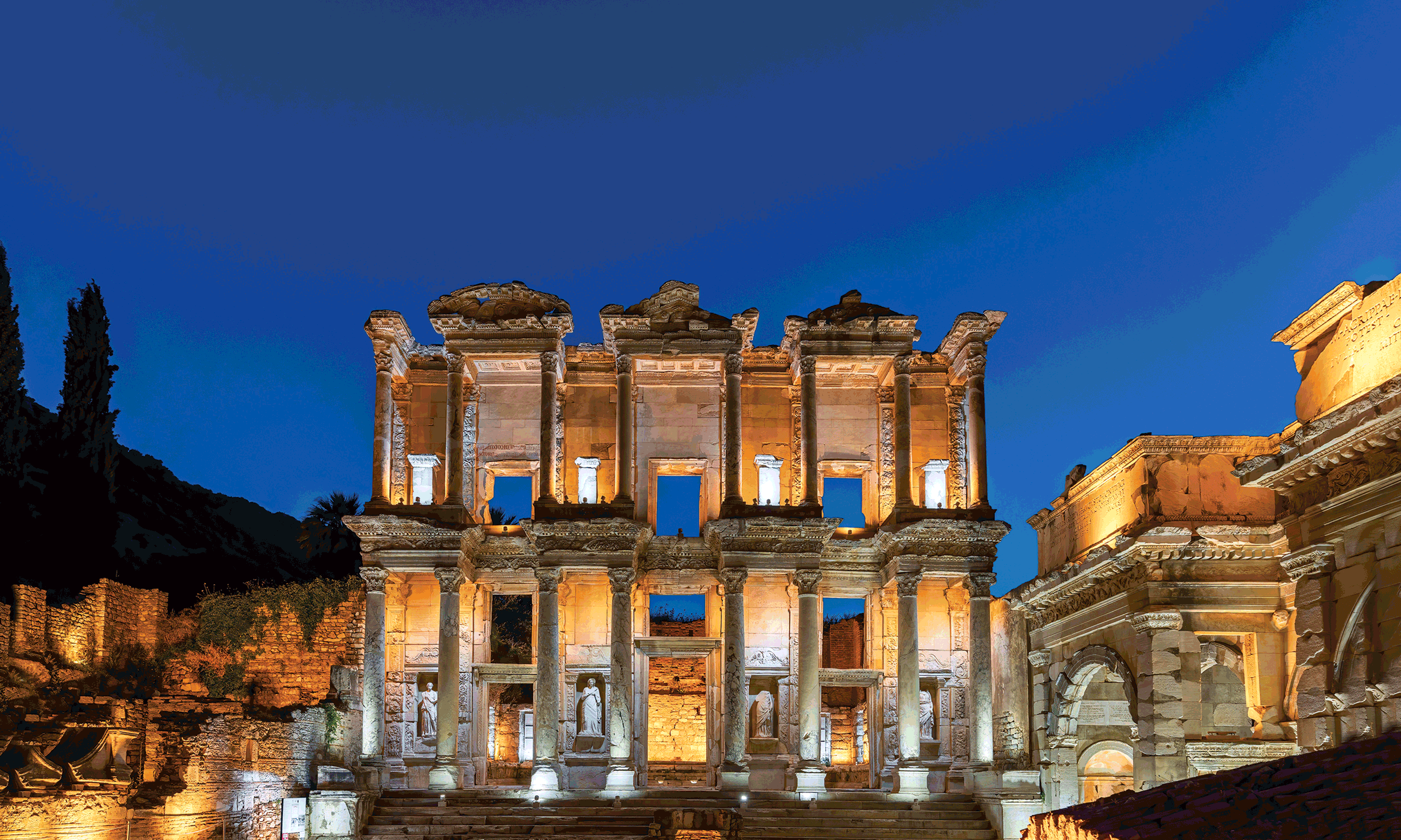The Library of Celsus at Ephesus at night; with searing summer heat, an evening visit is more appealing to many tourists
Photo: Merih Salmaz
The marble façade of the 1,900-year-old Library of Celsus sparkles, bathed in spotlights, drawing thousands of visitors to roam the Unesco World Heritage Site of Ephesus in Turkey every evening this summer.
Seven classical cities, a medieval castle and an archaeology museum on Turkey’s Aegean and Mediterranean coasts, are now open after dark, offering a new perspective on the country’s historical treasures—and a respite from the recent extreme temperatures.
More than 157,000 sightseers visited Ephesus at night in July, helping to make it likely to be Turkey’s top tourist attraction in 2024, the culture and tourism ministry told The Art Newspaper in a statement. So far this year, a total of 1.4 million people have toured Ephesus, around 50km south of Izmir, one of the world’s best-preserved ancient cities, founded in the tenth century BC.
Extended visiting hours “bring our country’s rich cultural heritage to wider audiences while diversifying the visitor experience”, the statement said. “Local and foreign guests have the opportunity to visit more ruins more comfortably in the evening away from the daytime heat, especially during the summer.”
Heatwaves are forcing tourist destinations across the Mediterranean to devise new coping mechanisms. Near Ephesus, temperatures broke records in June, exceeding 40ºC some days and making traipsing through its ruins onerous, if not hazardous.
The Greco-Roman sites of Hierapolis, Aspendos and Patara are among those open at night in what the culture and tourism minister Mehmet Nuri Ersoy called a “pilot project” in a recent interview on local television. Night tourism will lure people away from “the poolside at all-inclusive hotels” and boost a myriad of Turkish businesses that rely on tourist dollars, he said.
Blessed with thousands of miles of shoreline and archaeology spanning more than 10,000 years, the tourism sector is a cornerstone of Turkey’s $1 trillion economy, directly and indirectly contributing more than 10% to the country’s gross domestic product and an estimated two million jobs.
Ersoy said Turkey is aiming to attract 60 million foreign tourists this year to break last year’s record of 56.7 million.
But the surge in tourism is also adding stresses to Turkey’s landmarks, which include 15 sites on Unesco’s World Heritage List and dozens more under consideration.
“Viewing historical sites as a means of economic gain makes the work of conservation harder [and raises] the question, ‘Are we protecting history or are we commodifying it?’,” says Özgün Özçakır, the chairman of the Conservation and Restoration Specialists Association, a non-governmental organisation whose experts consult on heritage policies.
“Visiting a place like Ephesus at night allows people to see it in a different, genuinely beautiful environment … which contributes to the sense of having a stake in it,” he says. “But it will increase the number of people who exert pressure on a site [that] may not have the capacity to withstand [it].”
The culture and tourism ministry said dispersing visitors over more hours of the day “makes tourism sustainable” and described a “mutual interaction” with history that “increases Turkey’s attractiveness in tourism… and contributes to the preservation of our country’s cultural heritage.”
To ensure “minimum impact on historical buildings”, temperature-controlled LED lighting systems that emit lower ultraviolet and infrared light have been installed at the venues, the ministry said. It has “also increased the number of night security personnel at the sites for the safety of visitors and to protect historical artefacts”.
News outlets reported in June that Turkish sightseers sang patriotic songs to protest against the cordoning off of the Celsus library for passengers on a luxury cruise line to enjoy a private dinner beneath the towering, intricately carved exterior that housed one of the Roman Empire’s greatest centres of knowledge.
Bahattin Yücel, a former tourism minister, worries that “night museology is taking place in a disorderly environment, where it’s unclear who is coming and going… We are the custodians protecting this heritage for future generations, and if the question is whether we are sensitive enough to this—unfortunately we are not.”

